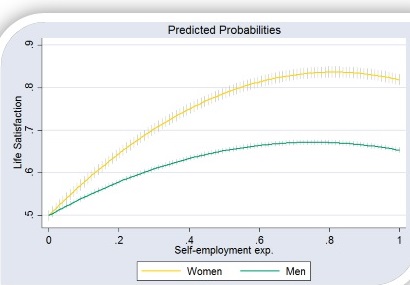
By Professor George Saridakis
Here, Kent Business School’s George Saridakis, Professor of Entrepreneurship and Small Business and Head of Department of Marketing, Entrepreneurship and International Business (MEIB) explains the connection between employment and life satisfaction, with a focus on his recently published collaborative research into self employment and life satisfaction.
Employment holds a central role in people’s lives, and people will choose their employment based on a series of factors to satisfy their needs. After all, the typical person will spend nowadays about 40 hours a week, 48 weeks every year at work.
A career comprises of a series of choices. Looking at a snapshot of individuals’ employment statuses ignores the path that led them there. Some will become self-employed, while others will work as wage-employees in someone else’s business. Over time, some wage-employees switch to self-employment, and some self-employed switch to wage-employment. Hence, the decision to become self-employed should not be thought of as an endpoint, but as part on an ongoing employment experience.
It is difficult to examine life satisfaction in isolation from their employment. Longitudinal studies that consider how life satisfaction and employment type change over time are better suited for the task.
A recent study published in the Journal of Business Venturing Insights by N. Litsardopoulos, G. Saridakis and C. Hand, offers important insights on how life satisfaction changes when more time is allocated to self-employment, and how the self-employment experience of women and men affects their life satisfaction over time (see Figure 1).
The study reveals important differences between women and men, indicating that women who allocated the greater proportion of their employment to self-employment gained higher life satisfaction than men.
The two main findings are that “women who spend more time in self-employment have a statistically significant positive effect on their life satisfaction”, whereas “men who spend more time in self-employment do not differ statistically from men who spend more time in wage-employment”.
This difference between men and women was an unexpected finding and has potential implications for entrepreneurship policy, as well as employment policy. Further research is needed to determine what drives this difference.
Professor George Saridakis is interested in the area of small firms and entrepreneurship. His research typically uses cross-sectional, time-series and panel data approaches. Currently, he is the Chair of the “Business Creation, Early Stage Development and Business Closure” track at the Institute for Small Business and Entrepreneurship (ISBE).





